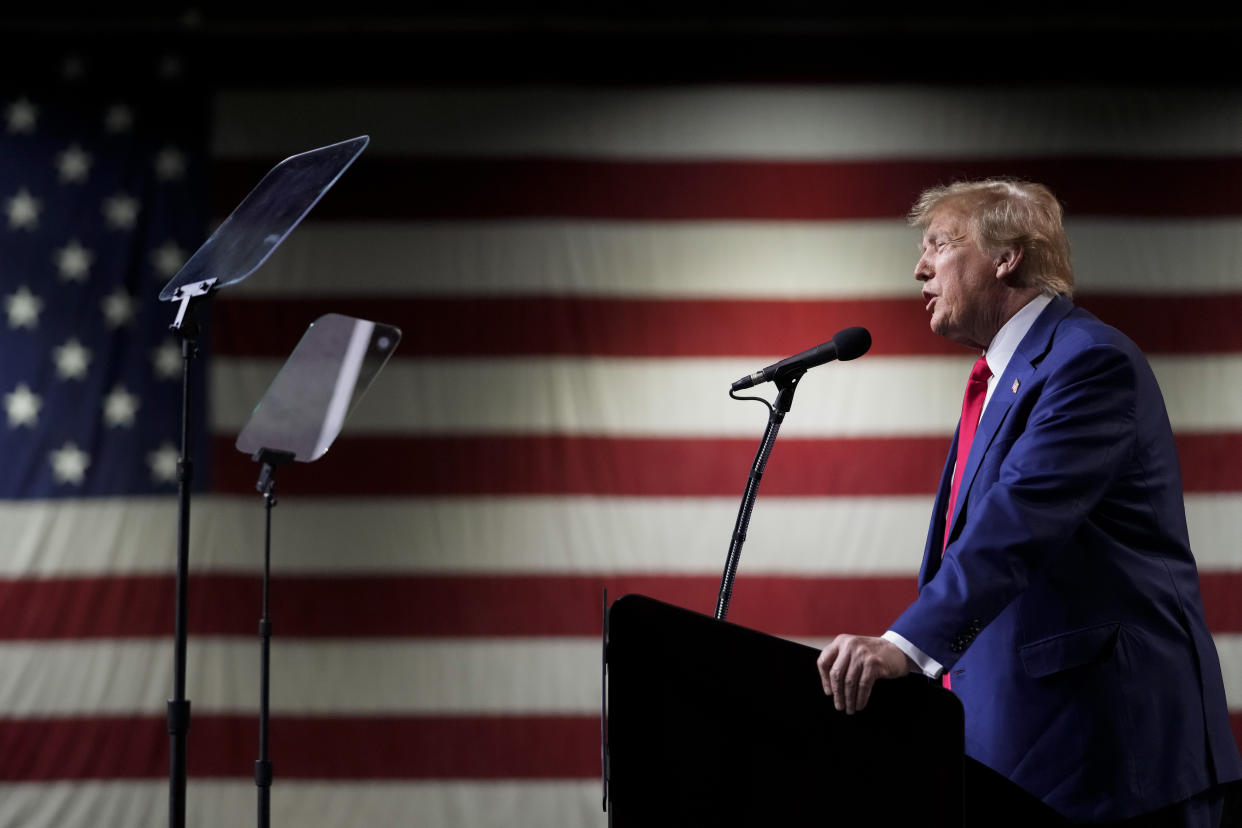Trump was disqualified from Colorado’s 2024 ballot under the 14th Amendment. What that means and what’s next.

Colorado's Supreme Court made history Tuesday in its ruling to ban former President Donald Trump from the ballot in the state’s 2024 Republican presidential primary using Section 3 of the 14th Amendment, a rarely used clause of the U.S. Constitution.
What does the ruling say?
In a divided 4-3 decision, the Colorado justices, who were all appointed by Democratic governors, ruled that Trump is ineligible to return to the White House under the 14th Amendment, citing his conduct surrounding the Jan. 6, 2021, deadly attack on the U.S. Capitol.
The ruling only applies to the state of Colorado’s March 5 Republican primary.
"We conclude that because President Trump is disqualified from holding the office of President under Section Three, it would be a wrongful act under the Election Code for the Secretary to list President Trump as a candidate on the presidential primary ballot," the court's majority opinion said. "Therefore, the Secretary may not list President Trump's name on the 2024 presidential primary ballot, nor may she count any write-in votes cast for him."
What does the 14th Amendment say?
The so-called insurrection clause, Section 3 of the 14th Amendment, bars anyone who once took an oath to uphold the Constitution — like members of Congress, the military, and federal and state offices — and “have engaged in insurrection or rebellion against the same, or given aid or comfort to the enemies thereof” from holding public office.
Trump has not been explicitly charged with “insurrection” or “rebellion” in any of his four criminal cases.
The provision also says if someone is found to be disqualified to serve, Congress can overturn that decision with a two-thirds majority.
When and why was it added to the U.S. Constitution?
Section 3 of the 14th Amendment was ratified during the Reconstruction era following the Civil War in 1868. Its goal was to prevent those who held roles in the Confederacy from becoming a member of Congress or being elected to other offices.
Have any other courts tried this before?
No, it’s the first time in U.S. history that Section 3 of the 14th Amendment has been used to disqualify a presidential candidate.
How are people reacting to the decision?
GOP members have condemned the Colorado decision and have rallied support around the frontrunner for the 2024 Republican nomination, including his political primary rivals.
Former New Jersey Gov. Chris Christie and former South Carolina Gov. Nikki Haley essentially both said it should be up to the voters of the country to decide who will be the next U.S. president — not a court.
Candidate Vivek Ramaswamy said he would take his name off the Colorado primary ballot until Trump is allowed to be on it and called on his primary rivals to do the same.
Meanwhile, Republican National Committee chair Ronna McDaniel dubbed the ruling “election interference” and vowed that the GOP nominee will be decided by Republican voters, “not a partisan state court.”
When asked if Trump was an insurrectionist on Wednesday, President Biden said: "It's self-evident. You saw it all. Now whether the 14th Amendment applies, I'll let the court make that decision. But he certainly supported an insurrection. There's no question about it. None. Zero.”
What impact would the ruling have on Trump in the 2024 presidential election?
Trump doesn’t need to win Colorado in the 2024 November election, as the state holds nine of the 270 electoral votes a candidate needs to win the Oval Office. Biden won the Democratic-leaning state in 2020 by more than 13 percentage points. In 2016, Hillary Clinton won the state by about 5 percentage points over Trump.
However, similar lawsuits in competitive states that Trump needs to win could use the Colorado decision as a road map to help reach their own decisions.
Are there other challenges like this in other states?
Efforts to block Trump from appearing on an election ballot have also been made in New Hampshire, Arizona and Michigan. A federal court in Arizona dismissed the lawsuit in early December, while New Hampshire’s secretary of state said in September he wouldn’t prohibit Trump’s name from being on the ballot.
In Michigan, a group called Free Speech for People is hoping their challenge to block Trump from the state ballot will prevail before the state’s Supreme Court after it lost in lower courts. The group asked for a decision no later than Christmas Day in order to meet ballot deadlines before the state’s Feb. 27 presidential primary.
Biden won Michigan in 2020, as well as Georgia, Nevada, Arizona, Wisconsin and Pennsylvania. Trump would need to flip a few of these states in order to declare victory in 2024, according to The Hill.
What happens next?
Colorado's justices put their decision on hold until Jan. 4 to allow for further appeals, which is one day before the deadline for Colorado to print its March 5 presidential primary ballots.
If the issue is pursued before the U.S. Supreme Court ahead of Jan. 4, the pause will remain in effect in Colorado. The state will then be required to include Trump’s name on the primary ballot while awaiting action by the Supreme Court.
Following Tuesday’s decision, a spokesperson for Trump’s campaign said they are swiftly filing an appeal to the U.S. Supreme Court and called the court’s decision “undemocratic.”
If the issue is taken up by the U.S. Supreme Court and it ends up ruling that Colorado’s decision stands, then that would mean it wouldn’t just apply to the Centennial State, but to all states.


